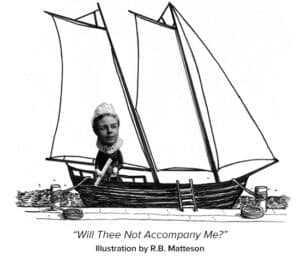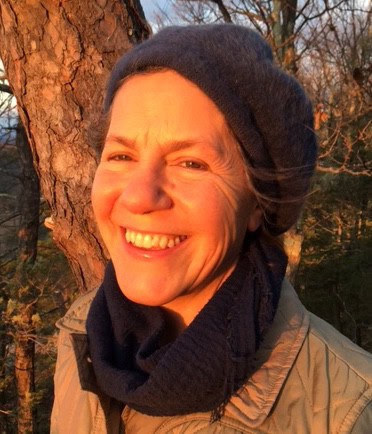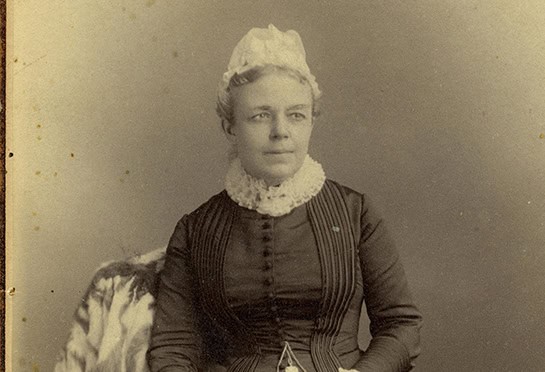By Louisa Finn, fourth generation Smiley family member
Episode #6: Sarah Smiley’s Journey South
The Sister of Mohonk’s Founder: A portrait in courage
As a child wandering the halls of Mohonk, I encountered the photo of Sarah Smiley in the hallway outside the Main Dining Room with a mixture of foreboding and amusement. The stark nature of her dress, and the serious, almost condemning look in her strong face made me wonder if I could be, or wanted to be, related to this person. It would be many years before I found that Sarah was a firebrand, controversial in her own family, and a fiercely independent woman, by any standards. Someone I’m exceedingly proud to call an ancestor!
Sarah Frances Smiley started out life steeped in the silent mysticism of the Quaker tradition– as had her older brothers Albert (Mohonk’s founder) and Alfred. But her spiritual path was to be quite different. She discovered that through rigorous study of the Bible, she was rewarded with an unparalleled sense of faith and salvation. Her study led her through Protestantism to the teachings of the Anglican Church, where she was destined to become a famous Evangelical preacher.
Albert and Alfred did not support her religious views; however, they provided her a monetary allowance for her needs, which enabled her to pursue her avocation. That Sarah’s spiritual journey burgeoned through reading and study led her to found a school of Anglican learning in 1889, The Home Society for the Study of Holy Scriptures. This was a kind of lending library along with coursework, which facilitated women’s ability to study the Bible for themselves (without male interpretation)–an unusual idea in that time! By the end of her life, Sarah amassed a library of over 6,000 volumes for this purpose.
Though Albert Smiley would not give money to Sarah’s religious project during his lifetime, he left a surprise gift in his will “to my sister Sarah, the sum of five thousand dollars to use as she may choose. May it be blest to the largest fulfillment of her hopes!” This she immediately left to her beloved library and school.
SARAH’S JOURNEY
Before she found her calling as a preacher, Sarah made a remarkable journey. She was only 35 years old in April 1865 when President Abraham Lincoln was assassinated. In an extraordinary and little-known bit of history, Sarah was one of four Quakers asked to accompany four generals of the Union Army in standing guard around Lincoln’s coffin before the burial.
Two days later, she felt called “through prayerful thought” to make a journey South, to minister to Quaker families suffering after the Civil War. Her journey required permission from the War Department. Sarah was the only woman on the journey. She was accompanied by R.U. Janney of the War Department and, along the way, some officers from the Union army. They brought $2,500 in food and clothing with them, traveling by boat from Washington to Morehead City, North Carolina, and then by train to Goldsboro, North Carolina.
At some point, their boat became unfit for traveling. The group had to evacuate and wait for a second boat, which Sarah describes in her journal as “small and un-seaworthy.” “Only the officers and ourselves were to go. The shabby cabin was crowded, but forthwith a panic seized the company and more than half of them went on shore, afraid to trust the lives made precious by the many perils they had escaped in the war, to such a craft on such a sea. I stood firm, and persuaded R.U. Janney to keep on. Finally, all but a few of the officers returned, one of them remarking to me that they ought to have as much courage as a lady. Yet it was not mere courage that kept me up, but faith that in pursuing such a mission, my life would be protected.”
That image doesn’t fail to make me smile when I think of it: 35-year-old Sarah Smiley standing firm in an un-seaworthy boat, her leadership of faith inspiring courage in a company of Civil War officers.
As “the only lady” on the journey, Sarah notes that “my comfort was at their mercy. Oaths and coarse jests began to circulate in the corners and I saw that I must rouse all my womanly tact to assert my womanly influence. Happily it prevailed in the end. I had with me Colton’s large map of Eastern North Carolina. An officer near me begged a glance and I spelled out our route–no easy one to understand without such help. One after another followed and all were highly gratified. That yard’s length of roll of maps was my salvation.”
After a two-hour conversation with two officers, she wrote: Those two hours were full of deepest interest for me. I was not only reading history before it was written but I was learning it from the men who were making it–and learning not facts alone, but the motions, aspirations and convictions of these men– and certainly they were far nobler than I had supposed…true patriots, who loving their country as a republic only can be loved, eyed her welfare as jealously as if each were her king.

Sarah’s journey down South after the Civil War was an act of indomitable will, bravery, and moral righteousness. Her journal writings illuminate how much she loved visiting people of all faiths, races, and classes. It was on this journey that she discovered her calling for preaching the Gospel.
Pondering Sarah’s Civil War journey made me consider how times of external bravery or force of will may lead to the unfolding of an internal path, and vice versa. It was in walking through the devastation and being with the suffering that Sarah’s spiritual calling was clarified. How many other leaders of great moral clarity have we seen who rose to greatness in times of adversity and loss, when the human stakes were at their highest?
When Sarah returned from her first journey South, she wrote the following in her journal:
I have been thinking quietly over the many things suggested by this two-weeks experience of Southern life, and one point I always reach is the conclusion that if we are only humble enough and wise enough, and we can be wise only if we are teachable, we shall at the end find the blessing designed for all of us, for the slave first, and then for both North and South. But much wrong there will be when there is so much temptation. Men of little principle led on by that great temptation of power over their fellow beings may yet pour in from the North to repeat the abuses of slavery. There will be a need more than ever for all earnest people, all who love the truth and right, to battle on. Such a time is rarely given to a nation, and as we sow, so shall we also reap.”
Humility, wisdom, earnestness, love of truth. The times we live in are hungry for what these words offer. Reading Sarah’s account of her journey made me ask myself; would I leave the comfort of my life to minister to people freshly ravaged by war, in the way Sister Sarah did? I have not been faced with this choice thus far in life, but I aspire to be the person who would.

Louisa Finn is a fourth generation Smiley family member. She is Secretary for Mohonk Consultations, Speech/Language Therapist, and poet. Her mother, Patricia Smiley Guralnik, directed the Festival of the Arts at Mohonk following the death of her husband, pianist Robert Guralnik. As a child, Louisa spent many days visiting her grandmother, Rachel Orcutt Smiley, who, in her later years, lived in Mohonk’s tower room 271. Currently, Louisa enjoys spending time in the Mohonk Archives, and reading the letters of her ancestors. Their words help to confirm her strong sense of the value of place, and inspire her to share the way past voices can instruct the present, and the future.

